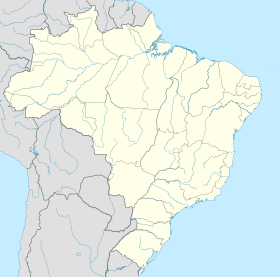Maringa, PR
| Maringá | |||
|---|---|---|---|
|
|||
| Nickname(s): Song City (Cidade Canção), Green City (Cidade Verde) | |||
 Municipal location |
|||
| Location in Brazil | |||
| Coordinates: 23°24′S 51°55′W / 23.400°S 51.917°WCoordinates: 23°24′S 51°55′W / 23.400°S 51.917°W | |||
| Country |
|
||
| Region | South | ||
| State |
|
||
| Government | |||
| • Mayor | Ulisses Maia | ||
| Area | |||
| • City | 487.93 km2 (188.39 sq mi) | ||
| • Metro | 5,978.592 km2 (2,308.347 sq mi) | ||
| Elevation | 515 m (1,821 ft) | ||
| Population (2016) | |||
| • City | 403.063 | ||
| • Density | 731.9/km2 (1,896/sq mi) | ||
| • Metro | 783.907 | ||
| Time zone | UTC-3 (UTC-3) | ||
| • Summer (DST) | UTC-2 (UTC-2) | ||
| Postal Code | 87000-000 | ||
| Website | Maringá | ||
Maringá (Portuguese pronunciation: [mɐɾiŋˈɡa]) is a municipality in southern Brazil founded on 10 May 1947 as a planned urban area. It is the third largest city in the state of Paraná, with 385,753 inhabitants in the city proper, and 764,906 in the metropolitan area (IBGE 2013). Located in northwestern Paraná, and crossed by the Tropic of Capricorn, it is a regional centre for commerce, services, agro-industries, and universities, including the State University of Maringá.
Maringá takes its name from a song by Joubert de Carvalho in honour of his great love, Maria do Ingá, later shortened to Maringá. As a result, the city is nicknamed "Song City". At the time the settlement was established, the song was very popular in the media.
In 1925, the Northern Paraná Land Company was established in London, England and was responsible for the management of more than 500,000 acres (2,000 km2) in the northern part of the State, which today contains some of the largest cities in Paraná.
The region's fertile land encouraged São Paulo colonists to move in and acquire new areas for production of coffee beans, an important product for exportation. The northern region of Paraná encloses nearly 100 thousand km². It is watered by the Rivers Paranapanema, Paraná, Ivaí and Piquiri. The urban project requested by the British Company Improvements North of the Paraná (Melhoramentos Co.) and elaborated by the city planner Jorge Macedo Vieira, defined the outlines of the new city. Maringá was received the category of city on 14 February 1951.
The Company, worried about deforestation proceeding from the occupation foreseen in the urbanistics projects, reserved three great ecological areas within the urban limits: the Forest Horto, the Park of the Ingá and Forest II and the city was planned as a "garden city" from the beginning.
Maringá is well served by internet, radio, print newspapers, television, telephone and mobile phone companies. Maringá has 15 TV stations and substations and 14 Radio FM stations.
...
Wikipedia



